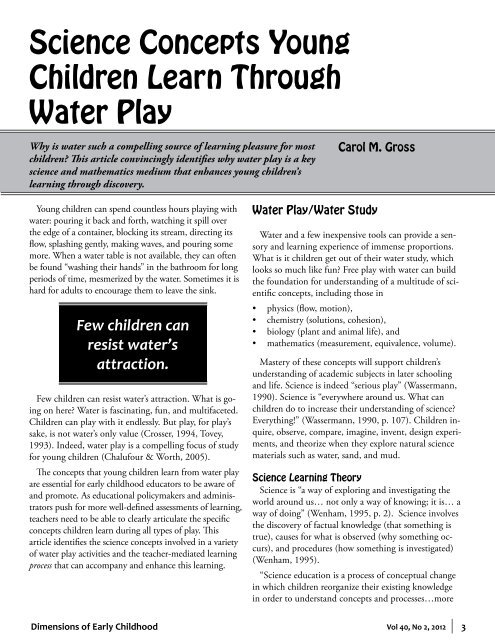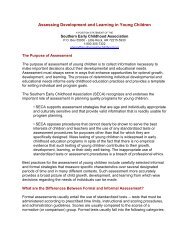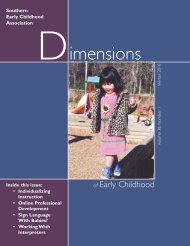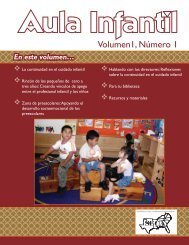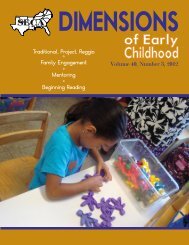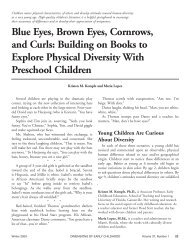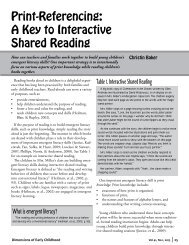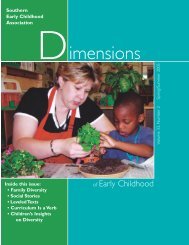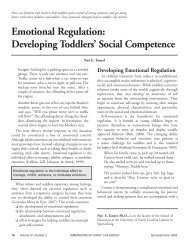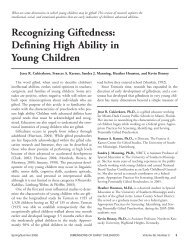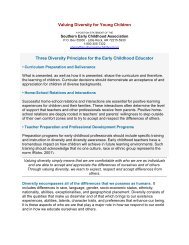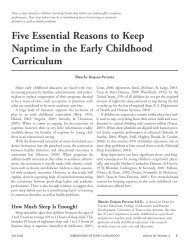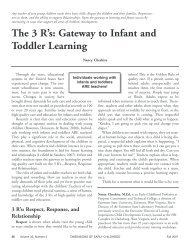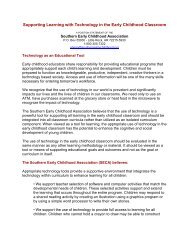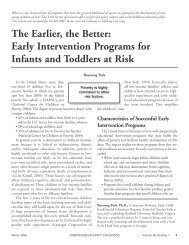Water Play - Southern Early Childhood Association
Water Play - Southern Early Childhood Association
Water Play - Southern Early Childhood Association
Create successful ePaper yourself
Turn your PDF publications into a flip-book with our unique Google optimized e-Paper software.
Science Concepts Young<br />
Children Learn Through<br />
<strong>Water</strong> <strong>Play</strong><br />
Why is water such a compelling source of learning pleasure for most<br />
children? This article convincingly identifies why water play is a key<br />
science and mathematics medium that enhances young children’s<br />
learning through discovery.<br />
Carol M. Gross<br />
Young children can spend countless hours playing with<br />
water: pouring it back and forth, watching it spill over<br />
the edge of a container, blocking its stream, directing its<br />
flow, splashing gently, making waves, and pouring some<br />
more. When a water table is not available, they can often<br />
be found “washing their hands” in the bathroom for long<br />
periods of time, mesmerized by the water. Sometimes it is<br />
hard for adults to encourage them to leave the sink.<br />
Few children can<br />
resist water’s<br />
attraction.<br />
Few children can resist water’s attraction. What is going<br />
on here? <strong>Water</strong> is fascinating, fun, and multifaceted.<br />
Children can play with it endlessly. But play, for play’s<br />
sake, is not water’s only value (Crosser, 1994, Tovey,<br />
1993). Indeed, water play is a compelling focus of study<br />
for young children (Chalufour & Worth, 2005).<br />
The concepts that young children learn from water play<br />
are essential for early childhood educators to be aware of<br />
and promote. As educational policymakers and administrators<br />
push for more well-defined assessments of learning,<br />
teachers need to be able to clearly articulate the specific<br />
concepts children learn during all types of play. This<br />
article identifies the science concepts involved in a variety<br />
of water play activities and the teacher-mediated learning<br />
process that can accompany and enhance this learning.<br />
<strong>Water</strong> <strong>Play</strong>/<strong>Water</strong> Study<br />
<strong>Water</strong> and a few inexpensive tools can provide a sensory<br />
and learning experience of immense proportions.<br />
What is it children get out of their water study, which<br />
looks so much like fun? Free play with water can build<br />
the foundation for understanding of a multitude of scientific<br />
concepts, including those in<br />
• physics (flow, motion),<br />
• chemistry (solutions, cohesion),<br />
• biology (plant and animal life), and<br />
• mathematics (measurement, equivalence, volume).<br />
Mastery of these concepts will support children’s<br />
understanding of academic subjects in later schooling<br />
and life. Science is indeed “serious play” (Wassermann,<br />
1990). Science is “everywhere around us. What can<br />
children do to increase their understanding of science?<br />
Everything!” (Wassermann, 1990, p. 107). Children inquire,<br />
observe, compare, imagine, invent, design experiments,<br />
and theorize when they explore natural science<br />
materials such as water, sand, and mud.<br />
Science Learning Theory<br />
Science is “a way of exploring and investigating the<br />
world around us… not only a way of knowing; it is… a<br />
way of doing” (Wenham, 1995, p. 2). Science involves<br />
the discovery of factual knowledge (that something is<br />
true), causes for what is observed (why something occurs),<br />
and procedures (how something is investigated)<br />
(Wenham, 1995).<br />
“Science education is a process of conceptual change<br />
in which children reorganize their existing knowledge<br />
in order to understand concepts and processes…more<br />
Dimensions of <strong>Early</strong> <strong>Childhood</strong> Vol 40, No 2, 2012 3


